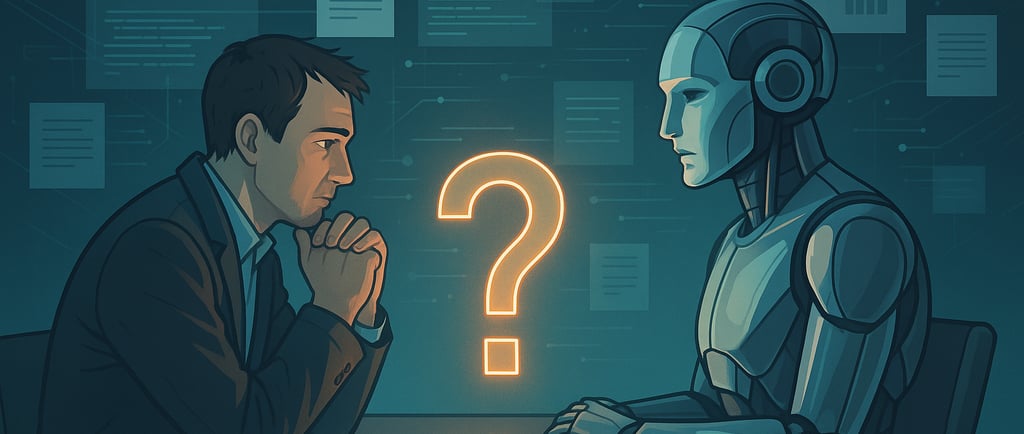Don’t Let AI Do Your Thinking For You
Rumman Chowdhury warns against surrendering our reasoning to machines. As AI grows smarter, it's up to us to stay in control—and stay intellectually alive.
BLOG PAGE
6/9/20254 min read


Think Before You Prompt: Why AI Shouldn’t Replace Human Judgment
Don’t Let AI Do Your Thinking for You
In a world intoxicated by automation, there’s one boundary we must not cross: outsourcing our minds.
That’s the clear and urgent message from Dr. Rumman Chowdhury, AI ethicist and founder of Humane Intelligence. As artificial intelligence becomes more advanced—more fluent, more persuasive, more embedded—Chowdhury urges us to hit pause. Not on AI development itself, but on our own willingness to let machines do our thinking for us.
“Critical thinking is a human job,” she emphasizes. “No matter how smart the machine becomes.”
And in 2025, as we watch AI creep into classrooms, boardrooms, and our personal lives, this warning may be more important than ever.
The Seductive Ease of Automation
AI doesn’t knock down the door and demand control—it offers convenience. It promises efficiency. It whispers, Let me help.
And it delivers. With just a few clicks, you can:
Auto-generate essays.
Summarize hundred-page reports.
Draft marketing campaigns.
Write wedding vows, apologies, or legal letters.
At first glance, this feels like progress—why waste energy thinking hard when an AI can do it for you in seconds?
But Chowdhury urges us to look deeper. The problem isn’t capability—it’s complacency.
The Real Danger: Cognitive Offloading
We’re not talking about AI going rogue. We’re talking about us stepping back. Giving away the very thing that makes us human—our ability to struggle through complexity, to wrestle with nuance, to judge, to reflect, to think.
This phenomenon has a name: cognitive offloading. It happens when we allow technology to replace—not enhance—our mental processes.
Chowdhury paints a chilling picture:
Students skipping critical thinking by prompting bots for answers.
Professionals deferring to AI-generated advice without verification.
Creatives filtering their work to match algorithmic trends rather than authentic expression.
In each case, a small but crucial part of human judgment is lost. And over time, that adds up—not to smarter societies, but duller ones.
AI Is a Tool—Not a Mind
At the core of Chowdhury’s critique is a simple truth: AI doesn’t understand.
It mimics. It predicts. It imitates patterns of human reasoning. But it lacks consciousness, ethics, experience, and meaning. It doesn’t know anything—it just generates.
This distinction is not academic—it’s essential.
When we assume AI is thinking, we forget that we’re the ones responsible for interpretation. And when we treat its outputs as wisdom rather than suggestion, we risk turning mirrors into mentors.
Chowdhury calls this out clearly:
“The danger isn’t that AI is too smart. It’s that people believe it is.”
Why This Matters Right Now
The speed of generative AI adoption is staggering. In just a few years:
ChatGPT gained over 100 million users.
Language models are being embedded in Google, Microsoft Office, and Apple products.
AI is now advising doctors, lawyers, teachers, and politicians.
This isn’t fringe technology. It’s becoming the default interface to knowledge.
And with every shortcut we take—every decision we delegate—we reinforce a behavior: don’t think, just prompt.
That’s not the future Chowdhury wants. Nor should we.
Historical Echoes: From Maps to Mental Laziness
This is not the first time humanity has offloaded thinking.
GPS made us forget how to navigate.
Calculators dulled mental arithmetic.
Social media curated our worldviews into echo chambers.
But generative AI is different. It doesn't just retrieve information—it constructs it. It generates narratives, arguments, simulations—realities.
And if we’re not careful, it will construct our beliefs too.
What We Risk Losing
Letting AI do the thinking for us isn't just lazy—it’s dangerous. Here’s what’s at stake:
1. Critical Thinking
Every time we default to AI instead of analysis, we weaken our ability to question, critique, and discern truth from fiction.
2. Creativity
Originality comes from wrestling with uncertainty. AI offers polished mediocrity—efficient, impressive, but soulless.
3. Moral Judgment
AI can write a speech, but it can’t judge what’s right. Ethics isn’t about probability—it’s about values. And values come from lived experience.
4. Accountability
When AI gives advice that goes wrong, who’s responsible? We are. But the more we rely on it, the harder that becomes to trace.
Chowdhury’s Solution: Co-Pilot, Not Captain
AI isn’t inherently harmful. Chowdhury is not anti-tech. In fact, she’s one of the leading voices for ethical, inclusive, and responsible AI design.
Her message is about balance. Use AI—but wisely.
She advocates for what she calls a “co-pilot model”:
✅ Use AI for brainstorming
✅ Use AI to explore multiple viewpoints
✅ Use AI to organize information
❌ Don’t let it make decisions for you
❌ Don’t take its outputs as facts
❌ Don’t let it replace the learning process
AI should amplify our thinking—not replace it.
The Long Game: A Society That Thinks for Itself
Imagine a generation raised on generative AI. They never learned to write without assistance. They never read deeply—they summarized. They never reflected—just replied.
What kind of future would that create?
A civilization that automated its intellect, until it no longer remembered how to think.
Chowdhury doesn’t want to see that world. Neither should we.
Because if we hand over our judgment to machines, we’re not evolving—we’re dissolving.
At Curiosity Cloned The Cat, We Ask the Impossible
We ask “What if AI were God?” or “Could machines feel pain?” But today, the question is both simpler and more urgent:
Will we stay human enough to keep asking?
AI can suggest. It can simulate. It can even surprise. But it cannot understand us. And it cannot replace us—unless we let it.
So before you hit that next prompt, pause.
Think.
You’re still the smartest system in the room.
Connect
Join our community for AI discussions and updates.
Contacts
Engage
© 2025. All rights reserved. Privacy Policy Terms and Conditions About Us
